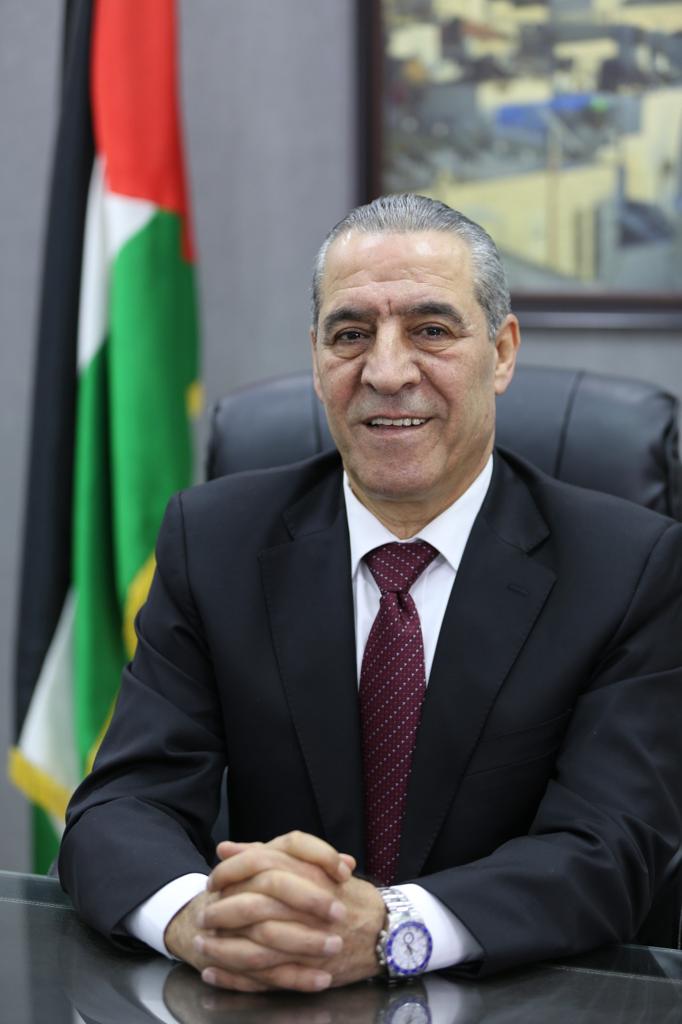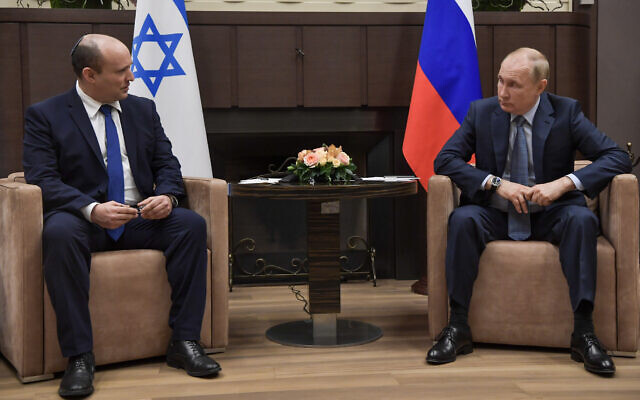Israel has inserted itself as a mediator in Russia’s three-week war with Ukraine. With the blessing of Ukraine and the United States, Prime Minister Naftali Bennett flew to Russia recently to discuss the hostilities with Russian President Vladimir Putin and gauge whether Israel can bring the two warring sides to the negotiating table. Since then, Bennett has called Putin and Ukrainian President Volodymyr Zelensky several times to continue their conversations regarding a ceasefire.
Israel’s efforts at peacemaking are laudable. But Israel should exert the same kind of vision, dedication, goodwill and energy to restart peace talks with the Palestinians, which broke down in the spring of 2014 after more than a year of discussions.
This thought came to mind after Israeli Foreign Minister Yair Lapid conducted back-to-back meetings with Hussein al-Sheikh, a senior advisor to Palestinian Authority President Mahmoud Abbas, and King Abdullah II of Jordan.

Lapid met Al-Sheikh on March 9 to discuss a wide range of issues. It was Lapid’s second meeting with him in less than two months. Israel’s Ministry of Foreign Affairs declined to release details of their conversation, but in a Twitter post, Al-Sheikh said he had told Lapid that the Israeli-Palestinian peace process should be revived.
“I emphasized to him the need for a political horizon based on signed agreements (between Israel and the Palestinian Authority) and international resolutions, as well as the cessation of unilateral measures that impede a two-state solution.”
Al-Sheikh is right.

The status quo perpetuates Israel’s unacceptable occupation of the West Bank and prevents a fair resolution of its protracted conflict with the Palestinians. This seemingly endless impasse can be broken only if both sides are sincerely interested in reaching a reasonable agreement whose end result would be the creation of a demilitarized Palestinian state at peace with Israel.
Unfortunately, Bennett — a hawk on territorial issues pertaining to the West Bank and an adversary of a two-state solution — is firmly opposed to renewing peace talks with the Palestinian Authority. Nor does he want to meet Abbas.
At best, Bennett is prepared to prop up the Palestinian Authority in its rivalry with Hamas and grant autonomy to Palestinians in the West Bank.

Regrettably, Lapid concurs with Bennett’s counter-productive policy, having said it will remain in place after he replaces Bennett as prime minister in 2023 under their rotation pact. “I will abide by every agreement I made with my (coalition) partners,” he said two months ago.
That being the case, no meaningful political breakthrough in Israel’s dispute with the Palestinians can be expected, now or in the near future. This means that Israel will continue to recklessly expand its network of settlements and thereby further entrench itself in the West Bank, foreclosing the chance of a fair and equitable peace agreement based on the concept of two states for two people.
The day after he met Al-Sheikh, Lapid went to Amman to see King Abdullah II. It was his second meeting with the Jordanian monarch in 10 months.
“We agreed that we must work together to calm tensions and promote understanding, particularly in the lead-up to Ramadan and Passover,” Lapid said in a bland and anodyne statement. “Our special relationship with the Kingdom of Jordan ensures a better future for our children.”
The king’s statement was far more practical. He reaffirmed “the need to step up efforts to achieve a just and comprehensive peace on the basis of the two-state solution that guarantees the establishment of an independent, sovereign and viable Palestinian state, on the 4 June 1967 lines, with East Jerusalem as its capital.”
Jordan’s territorial definition of a peace agreement is not sacrosanct or carved in stone. Adjustments can be made to factor in land swaps and special security arrangements. But if fairness is to prevail, the Palestinians should have a geographically contiguous state.
It would appear that neither Bennett nor Lapid are ready for such an outcome. Yet this Israeli government is willing to bend over backwards to try to stop the senseless war Russia has inflicted on Ukraine.
In its own backyard, however, Israel prefers the dead-end status quo, with all its attendant consequences. Sadly enough, Israel is unwilling to take the pragmatic, concrete and necessary steps to end its wasteful conflict with the Palestinians.
The glaring disconnect between Israel’s peacemaking efforts in Eastern Europe and its reliance on military power to perpetuate its occupation in the West Bank and deny the Palestinians statehood is nothing less than disappointing and, perhaps, even hypocritical.
